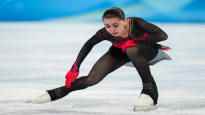The International Skating Federation voted to raise the age limit on Tuesday. 100 countries supported the reform and only 16 opposed it.
7.6. 11:39 • Updated June 7th. 12:59
In figure skating, the minimum age for adult competitions will increase from the age of 15 to 17, according to the news agency AFP.
The matter was decided by the International Skating Federation (ISU) at its meeting in Phuket, Thailand, on Tuesday. The decision is based on the doping of the Beijing Winter Olympics, when a 15-year-old Russian figure skater Kamila Valijeva caught using prohibited substances.
100 countries voted in favor of the measure, with only 16 opposing it.
– This is a very historic decision, the president of the ISU Jan Dijkema commented after the vote.
In preparing the decision, the Athletes’ Board interviewed nearly 1,000 athletes and coaches, 86 percent of whom were in favor of raising the age limit.
Before the vote, the Director-General of the ISU Fredi Schmid admitted that the association had received enormous pressure from the media to take the matter to court. The CEO had stressed to delegates that the reputation of the species was at stake.
– Today is a moment of truth, because the credibility of the ISU is also being looked at. The media and the audience follow us very closely, don’t forget that, Schmid said according to AFP.
The association has a responsibility for the well-being of top young athletes
The skate union’s medical advisers were also in favor of raising the age limit to 17 years. Experts stressed that raising the age limit will benefit young skaters both physically and mentally.
According to a medical report, raising the age limit will give young athletes time to reach maturity in developing skeletal body. The report says some top athletes may experience a delay in puberty of an average of two years due to the physical demands of training and insufficient energy intake.
– Skaters have the right to develop themselves as people in their teens … They don’t have to force us to compete, Doctor Jane Moran about the Medical Commission.
In a vote, some representatives of small countries argued that the changes would have a negative impact on their ability to send athletes to elite competitions.
Other smaller skating states, such as Iceland and Ireland, emphasized the issue of protecting young people.
– We must remember that they are first children and then only athletes, said the Irish representative in Phuket.
The reform is planned to be implemented gradually over the coming years by 2024-25.
